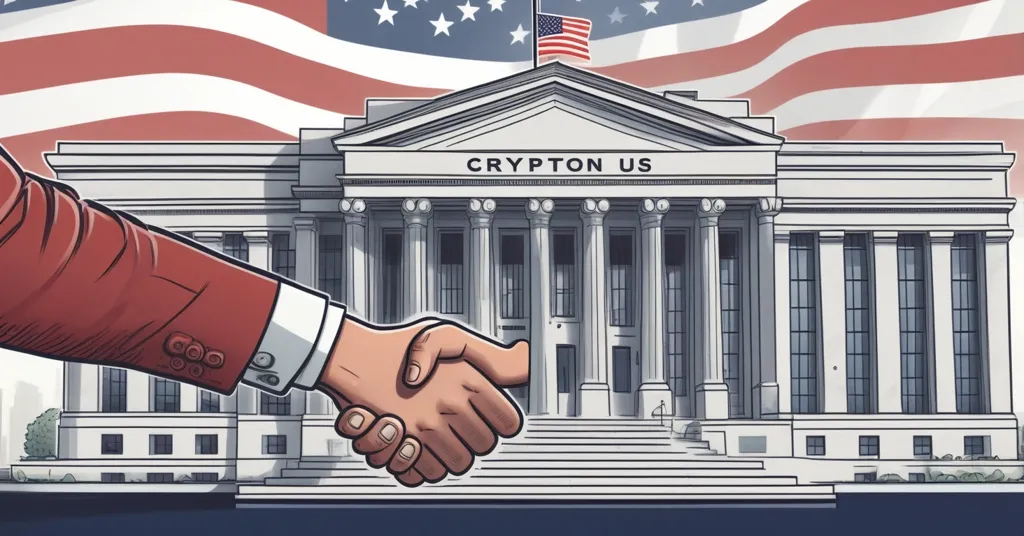Banking Titans and Crypto Firms Target US Expansion Amid Regulatory Shift

Banking Giants and Crypto Firms Eye US Expansion Amid Regulatory Shifts
The crypto world is abuzz as banking giants like Deutsche Bank and Standard Chartered explore expanding their cryptocurrency operations in the US, following a surge of crypto firms eyeing the American market.
- Crypto firms like Circle, BitGo, Coinbase, and Paxos explore US expansion.
- Deutsche Bank and Standard Chartered assess crypto market entry.
- Trump administration fosters a more industry-friendly regulatory environment.
- Legislation like the GENIUS Act aims to regulate stablecoins.
The US regulatory landscape has seen a notable shift under the Trump administration, moving away from a “regulation by enforcement” approach—a method of regulating through legal actions rather than clear rules—to a more welcoming stance for the crypto industry. This change has spurred both cryptocurrency companies and traditional banks to consider expansion in the lucrative US market.
Crypto firms such as Circle, BitGo, Coinbase, and Paxos are actively seeking bank charters or licenses to deepen their operations in the US. This move is driven by the promise of a market known for its potential, yet traditionally challenging for digital assets. Conversely, major banks like Deutsche Bank and Standard Chartered are cautiously assessing their potential entry into the US crypto market. Their interest is fueled by the anticipation of clearer regulatory frameworks that could pave the way for mainstream financial institutions to engage with digital assets more confidently.
Bank of America CEO Brian Moynihan has expressed a readiness to embrace crypto payments and even issue stablecoins—digital currencies designed to have a stable value, often pegged to a real-world asset like the US dollar—once legal frameworks are firmly established. His perspective highlights the cautious optimism within traditional finance towards cryptocurrencies.
“The banking system will come in hard on the transactional side of it,” – Brian Moynihan, Bank of America CEO
This shift in the regulatory environment is also reflected in the actions of the Securities and Exchange Commission (SEC), which has dropped or paused most of its major enforcement cases against crypto entities, signaling a more lenient approach.
On the legislative front, US lawmakers are pushing for policies that could shape the future of cryptocurrencies in the country. The GENIUS Act, introduced by Senator Bill Hagerty, aims to establish a regulatory framework for stablecoins under Federal Reserve rules. The legislation is described as a move to create a “safe and pro-growth regulatory framework that will unleash innovation and advance the President’s mission to make America the world capital of crypto.”
Additionally, the proposal for a Strategic Bitcoin Reserve (SBR)—akin to gold reserves held by governments, but for Bitcoin—underscores the growing acceptance of Bitcoin and other cryptocurrencies as potentially valuable assets that could be managed strategically by the government.
For Bitcoin enthusiasts and maximalists, these developments are both exciting and concerning. Increased mainstream adoption by banks could drive up demand and legitimacy for Bitcoin. However, it raises questions about centralization and Bitcoin’s core principles of decentralization and freedom. As banks enter the crypto space, Bitcoin’s community must remain vigilant to ensure its integrity is not compromised.
At the time of writing, Bitcoin (BTC) was trading at $88,201, reflecting the ongoing interest and volatility in the crypto market. While this news is certainly exciting, it’s important to remain realistic. The crypto world is notorious for its ups and downs, and while the potential for banks to embrace digital assets is promising, it comes with its own set of challenges and risks. Regulatory clarity is still a work in progress, and the integration of crypto into traditional banking systems could face hurdles related to security, compliance, and consumer trust.
Despite these challenges, the move by banks and crypto firms to expand in the US signifies a crucial step towards mainstream adoption. It’s a testament to the resilience and potential of cryptocurrencies to disrupt the financial status quo, championing decentralization and freedom. However, as always, investors and enthusiasts should approach with a clear-eyed perspective, understanding both the opportunities and the pitfalls.
Key Takeaways and Questions:
-
What crypto firms are looking to expand their operations in the US?
Circle, BitGo, Coinbase, and Paxos are among the crypto firms exploring bank charters or licenses to expand in the US market.
-
Which traditional banks are exploring crypto operations in the US?
Deutsche Bank and Standard Chartered are actively exploring ways to expand their crypto operations in the US.
-
How has the Trump administration’s approach to cryptocurrency regulation changed?
The Trump administration has shifted from a “regulation by enforcement” strategy to a more industry-friendly approach, encouraging crypto firms and banks to consider expansion.
-
What is the role of the Securities and Exchange Commission (SEC) in this context?
The SEC has dropped or paused most of its major enforcement cases, indicating a less stringent approach to cryptocurrency regulation under the current administration.
-
What legislative efforts are being made to regulate stablecoins in the US?
US lawmakers have proposed the GENIUS Act, which aims to establish a regulatory framework for stablecoins under Federal Reserve rules.
-
What is the stance of Bank of America’s CEO on cryptocurrency?
Bank of America CEO Brian Moynihan expressed readiness to embrace crypto payments and issue stablecoins once a clear regulatory framework is established.
-
What is the purpose of the GENIUS Act?
The GENIUS Act aims to establish a safe and pro-growth regulatory framework for stablecoins to unleash innovation and make America the world capital of crypto.
-
How might these developments impact Bitcoin?
Increased mainstream adoption could drive up demand and legitimacy for Bitcoin, but it also raises concerns about centralization and the preservation of Bitcoin’s core principles of decentralization and freedom.



